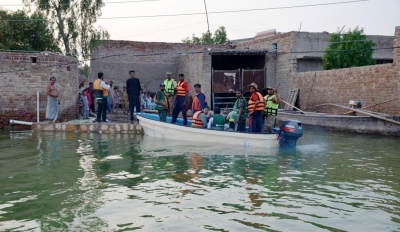Islamabad, March 22 : More than 10 million people, including children, still lack access to safe drinking water after the catastrophic floods hit Pakistan from June to October last year, the Unicef said.
“Safe drinking water is not a privilege, it is a basic human right,” said Abdullah Fadil, the Unicef representative in Pakistan.
“Yet, every day, millions of girls and boys in Pakistan are fighting a losing battle against preventable waterborne diseases and the consequential malnutrition,” Xinhua news agency quoted Fadil as saying
Among the waterborne diseases spread by “widespread” outbreaks of cholera, diarrhoea, dengue, and malaria, the UN agency warned that the lack of safe drinking water and proper toilets, and stagnant water are contributing factors.
Unicef notes that the lack of proper toilets “disproportionately affects children, adolescent girls, and women, who are at increased risk of shame and harm when defecating outside”.
Unsafe water and poor sanitation are also “key underlying causes” of malnutrition.
Unicef also highlighted that a third of all child deaths globally are attributable to malnutrition, while half of all undernutrition cases are linked to infections caused by a lack of access to safe water, adequate sanitation and good hygiene.
More than 1.5 million children in Pakistan’s flood-affected areas are already severely malnourished, and Unicef expects the number to rise.
Malnutrition is associated with half of all child deaths in the country.
Floods triggered by severe monsoon rains last year submerged a third of Pakistan’s land and killed at least 1,739 people.
It is estimated that over 33 million people were affected overall, or one in seven Pakistanis, and 8 million others were displaced, causing major humanitarian problems.
The UN reported on Tuesday that as of March 15, humanitarians had reached more than 7 million flood-affected Pakistanis with food and other essential services.
Unicef and partners have so far provided safe drinking water to nearly 1.2 million children and families, and supported the rehabilitation of water supply facilities benefiting over 450,000 people.
The UN body has called for additional resources to restore access to safe drinking water and proper toilets in flood-affected areas ahead of Wednesday’s World Water Day.
Investment is also needed in climate-resilient water supply facilities, such as those powered by solar energy.
There is less than 50 per cent funding for Unicef’s $173.5 millionappeal for this crisis.
#Pakistanis #lack #floods #Unicef #Bally #UNICEF







